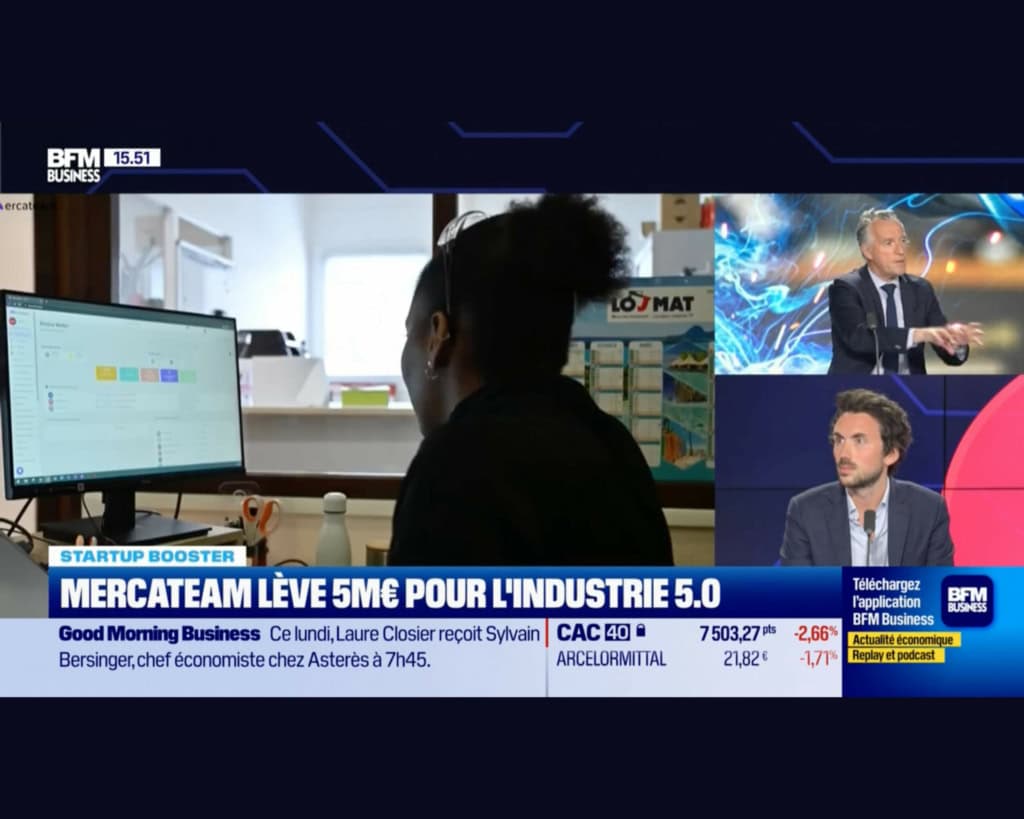Adrien Laurentinco-founder of Mercateam, explains to his friend Laura why organizing, mastering and leveraging industrial know-how is key to the success of Industry 4.0 and reindustrialization. And why he created Mercateam with Kévin Rouvière.
Laura, you asked me to explain what we do at Mercateam...But when I answered "we develop a SaaS solution that helps industrial and service companies to organize, enhance and transmit employee knowledge" it wasn't clear... So I'm going to tell you why we do it instead...
The world is moving at full speed Laura, the rate of innovation is growing exponentially, with more innovation in the last 100 years than in the previous 4,000. The war in Europe, the energy and environmental crises are accelerating changes in consumption and production to preserve a planet that is worn out and can't take it any more: it's all these new constraints that are shaping tomorrow's innovation. And, even more than other sectors, industry, which is at the origin of all products, must evolve to cope.
This means we have to rethink everything: the whole industry is going to have to change, and fast. But today, as always, industry will do nothing without man. And that's why we're here at Mercateam We believe that people will be at the heart of this revolution, and we intend to help them get there.
At the risk of sounding too academic, I'd sum up the sector's challenges in 3 parts.
Industrial know-how skills in the age of industry 4.0 and environmental challenges
First and foremost, Industry 4.0 is the term used to describe the fourth great industrial revolution, characterized by new modes of production in factories.
In fact, to optimize their production chains, the "factories of the future" rely on artificial intelligence, robotics, the Internet of Things, 3D printing and cloud computing. These are complicated words and concepts that are evolving at the speed of light, and must be mastered by any company aspiring to be competitive.
At the same time, we realize that we can no longer produce at all costs, as our planet has its limits. To consume less, to pollute less: we need to be even more ingenious and change our production processes.
The problem is that to respond to these revolutions requires industrial know-how. Let me give you an example: Europe has decided to stop allowing diesel cars by 2033... So, we need to rethink our products and the way we produce them ("Good luck, industrialists"). At the same time, a BPI study shows that 75% of plant managers in Europe believe that their teams do not yet have the skills to meet the needs of the coming years. Put another way, we're not skilled or technical enough to cope.
And unfortunately, there's more to come Laura! Because when you say "innovation", you say new professions... which will kill off others. Yes, 30% of the jobs we know today will no longer exist in the next 10 years, for the reasons given above. With these new technologies, some jobs will appear and others will disappear.
So manufacturers are realizing that they urgently need to anticipate change, simplify and digitize skills tracking, and put in place plans to rapidly upgrade people's skills and, if need be, steer them towards new professions.
In other words, who can do what and who will have to do what tomorrow. What if they don't? They'll be heading straight for the wall, towards massive lay-offs.
European awareness: let's relocate our industrial know-how fast, fast, fast!
Laura, have you noticed that everyone is talking about relocation in the media? Covid has shown that we're incapable of producing our own masks or medicines to respond to a crisis, and the whole of Europe is worried about energy cuts. In short, we're too dependent on others.
The only problem is that you weren't born yet, but 30 years ago, we made the opposite decision, sending our factories abroad "because it was cheaper".
As a result, we haven't nurtured our industrial know-how at all. How can you start a memory card factory if nobody knows how to make them? It's a bit like asking you to help me assemble my IKEA furniture without a plan...
We need to be able to replicate foreign models in France and train a lot of people in these processes. It's possible, but we need to recruit, train, simplify and digitalize skills and training to enable everyone to acquire the necessary skills as quickly as possible.
All this, bearing in mind that this reappropriation of the value chain is a challenge that is being played out at European level.
The old demons of industry: labor costs, drudgery, turnover, productivity, retirement...
Olalala I'm opening Pandora's box on this explanation and I'm going to have to generalize but oh well.
The cost of labor is high in France, don't you agree? We can't compete with developing countries. In the end, if a packet of French pasta costs 3€ and a packet of Brazilian pasta costs 1€, our packet won't sell. So, to remain competitive, we have to make technical products with high added value and quality, and at the same time maximize our productivity. But this productivity depends above all on people, and that's where we have a problem:
- Turnover is too high and so is absenteeism. In one factory, the absenteeism rate is 8% means you have 8 people out of 100 who don't come in on average every day. This means that employees aren't satisfied enough in some way, so how do you coordinate the organization under these conditions?
- Factory agility in terms of teams is low, the ability to react is poor and people are always doing the same job, not moving around enough (cuckoo multi-skilling). It's painful for them and counter-productive for the company.
- Older people are retiring with their industrial know-how (30% of industrial employees will retire in the next 10 years) and young people, who are fewer and fewer (due to demographics), no longer want to work in the industrial sector. But if nobody knows how to run a factory or workshop anymore, what are we going to do? Industry is everything you wear, everything you travel with and a good part of what you eat!
How does Mercateam help manufacturers organize, promote and pass on their industrial know-how?
So what do we do at Mercateam? Well, we're constantly developing digital functionalities available on tablet, smartphone or screen to meet these challenges, and we have over 100 use cases around team management and industrial know-how, for example:
- We value our employees and help the organization reduce turnover. People stay longer because we give them visibility!
- We create an automatic schedule that assigns all the people in the plant in the best possible way, while improving their working conditions (and by the way, each manager saves 7 hours a week on the composition of his schedule).
- We've developed a skills management tool that enables us to increase our agility to ensure we're always producing.
- We enable the group's top management to analyze the situation using AI (retirement, loss of skills, etc.) and to guide people towards the jobs of tomorrow by setting objectives.
- Operators can train by scanning a QR code in the field, and upgrade their skills in line with the objectives defined by the Group.
- We automate and simplify training so that the group can build up skills more quickly (training time is divided by 4).
That's why Dior, Andros, Guerlain, Richemont, Sanofi, Merck, and hundreds of other sites on 3 continents trust us. We've talked about it twice on BDM business.
In short, the conclusion is simple: we're about to experience a series of revolutions that will require companies to master their industrial know-how over the long term, and Europe as a whole is already lagging behind in the short term. Industry is not yet agile enough to respond to demanding, flexible demand. As usual, the solution lies in the hands of people, who just need a little push.




